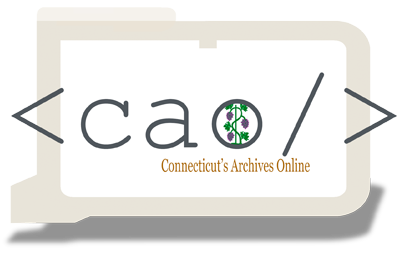« Previous |
51 - 53 of 53 collections
|
Next »
Number of results to display per page
Search Results
Wetmore family papers, 1638-1921
5.5 Linear Feet- Abstract Or Scope
-
The papers consist of materials relating to George Peabody Wetmore and his family. Correspondence and other papers document the lives of several of Wetmore's ancestors and reflect his interest in New England history. The papers also include letter books and account books of the mercantile firms of Prosper Wetmore & Brothers and Joseph and Joshua Grafton.
1 result
William Jackson papers, 1782-1828
0.5 Linear Feet- Abstract Or Scope
-
The papers consist of correspondence, memoranda, and miscellaneous items of William Jackson, a major in the American Revolution and later an active political figure. Most of the items in the papers are letters received by Jackson between 1782 and 1828. Also included are memoranda relating to payments for surviving officers of the Continental Army and an account of the surrender of Lord Cornwallis. Among the correspondents are John Quincy Adams, Alexander Garden, Joseph Hopkinson, Ebenezer Huntington, Benjamin Lincoln, Charles Pinckney, John Sergeant and George Washington.
1 result
William Jackson papers, 1782-1828 0.5 Linear Feet
- Creator
- Jackson, William, 1759-1828
- Abstract Or Scope
-
The papers consist of correspondence, memoranda, and miscellaneous items of William Jackson, a major in the American Revolution and later an active political figure. Most of the items in the papers are letters received by Jackson between 1782 and 1828. Also included are memoranda relating to payments for surviving officers of the Continental Army and an account of the surrender of Lord Cornwallis. Among the correspondents are John Quincy Adams, Alexander Garden, Joseph Hopkinson, Ebenezer Huntington, Benjamin Lincoln, Charles Pinckney, John Sergeant and George Washington.
- Collection Context
-
Woolsey family papers, 1750-1969, bulk 1811-1921
52 Linear Feet- Abstract Or Scope
-
The papers document three generations of the Woolsey family. The most prominent figures in the collection are William Walton Woolsey (1766-1839), land owner and merchant in New York City; his son, Theodore Dwight Woolsey (1801-1889), Greek scholar, political theorist and president of Yale College; and Theodore Salisbury Woolsey (1852-1929), professor of international law at Yale Law School, son of Theodore Dwight Woolsey. The papers of William Walton Woolsey contain extensive business correspondence, ledgers, legal papers, documents relating to land sales in New York and Ohio, as well as family and personal letters. Since he was engaged in the importation of sugar, cotton and hardware, some of his business correspondence is political with discussions of the Jay Treaty of 1794, the problems of piracy, American neutrality in the 1790s and the general politics of the period. Important correspondents are Chauncey Goodrich, Archibald Gracie, Eli Whitney, Noah Webster, Elihu and Nathaniel Chauncey, Oliver Wolcott, Benjamin Tallmadge, Jedidiah Morse, James Roosevelt, John A. Schuyler, Comfort Sands, John Broome, and Nicholas Bayard. The papers of Theodore Dwight Woolsey contain his writings on Greek language and literature, the Bible, international law and the texts of his sermons.
1 result
Woolsey family papers, 1750-1969, bulk 1811-1921 52 Linear Feet
- Creator
- Woolsey family
- Abstract Or Scope
-
The papers document three generations of the Woolsey family. The most prominent figures in the collection are William Walton Woolsey (1766-1839), land owner and merchant in New York City; his son, Theodore Dwight Woolsey (1801-1889), Greek scholar, political theorist and president of Yale College; and Theodore Salisbury Woolsey (1852-1929), professor of international law at Yale Law School, son of Theodore Dwight Woolsey. The papers of William Walton Woolsey contain extensive business correspondence, ledgers, legal papers, documents relating to land sales in New York and Ohio, as well as family and personal letters. Since he was engaged in the importation of sugar, cotton and hardware, some of his business correspondence is political with discussions of the Jay Treaty of 1794, the problems of piracy, American neutrality in the 1790s and the general politics of the period. Important correspondents are Chauncey Goodrich, Archibald Gracie, Eli Whitney, Noah Webster, Elihu and Nathaniel Chauncey, Oliver Wolcott, Benjamin Tallmadge, Jedidiah Morse, James Roosevelt, John A. Schuyler, Comfort Sands, John Broome, and Nicholas Bayard. The papers of Theodore Dwight Woolsey contain his writings on Greek language and literature, the Bible, international law and the texts of his sermons.
- Collection Context
-
 Connecticut's Archives Online
Connecticut's Archives Online